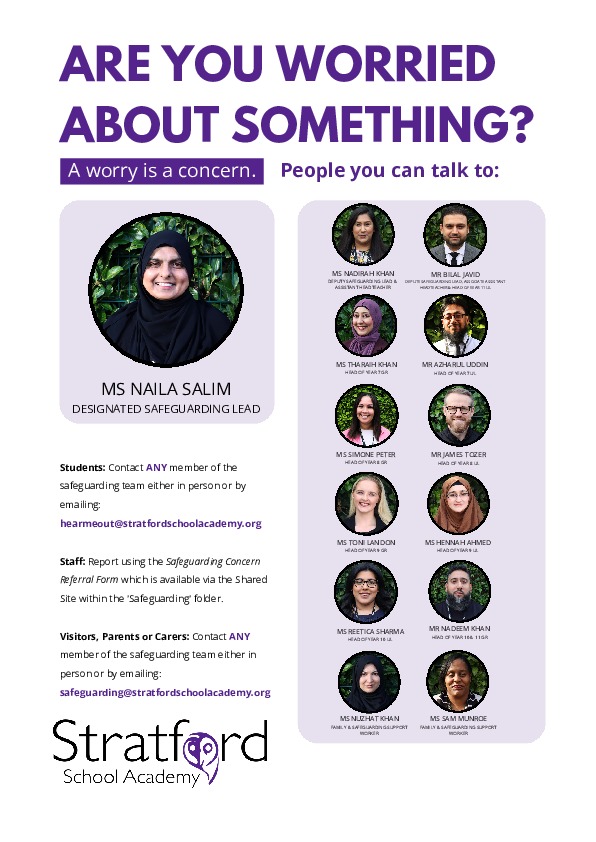- Home
- About
- Safeguarding
Safeguarding
SSA is committed to ensuring that consistent effective safeguarding procedures are in place to support students, families and staff at school.
Safeguarding and promoting the welfare of children is everyone’s responsibility. Everyone who comes into contact with children and their families has a role to play. In order to fulfil this responsibility effectively, all practitioners should make sure their approach is child-centred. This means that they should consider, at all times, what is in the best interests of the child
Department for Education
Safeguarding Policy
At SSA all staff (including temporary staff, volunteers and governors) are aware of the Safeguarding Policy. All staff are trained in relation to child protection and other issues surrounding safeguarding. Students are encouraged to talk and are listened to, knowing there are adults in the school whom they can approach if they are worried or have concerns.
Sometimes we may need to share information and work in partnership with other agencies when there are concerns about a student’s welfare and well-being. We will ensure that our concerns about our students are discussed with their parents/carers first unless we have reason to believe that such a move would be contrary to the child or young person’s welfare.
Our safeguarding policy can be found on the Policies page.
How to raise a concern
If you have any concerns in regards to the safety/well-being of a student at Stratford School Academy, please email:
safeguarding@stratfordschoolacademy.org Examples of this can include, online bullying or noticing a dramatic change in behaviour or anything else that you think is a safeguarding concern. A member of the safeguarding team will pick up the email and get in touch with you. We are here to help.
Safeguarding Team

Useful Websites
Operation Encompass directly connects the police with schools to ensure support for children living with domestic abuse in their homes when there has been a police attended incident of Domestic Abuse. Rapid provision of support within the school environment means children are better safeguarded against the short-, medium- and long-term effects of domestic abuse.
Childnet International, a non-profit organisation working with others to help make the internet a great and safe place for children.
Bringing together the NSPCC’s expertise in protecting children and O2’s tech know-how, they're helping you keep your kids safe online. Whether you’re an online expert or you’re unsure of where to start, they're here to help.
Get Safe Online is the UK’s leading source of unbiased, factual and easy-to-understand information on online safety.
Facebook’s own page explaining its privacy settings to users.
Get the latest crime statistics and advice, help us with appeals for information and find out what we’re doing to tackle crime in your area.
Government advice and trusted resources for schools to safeguard students from radicalisation, build resilience to all types of extremism and promote shared values.
The Child Exploitation and Online Protection (CEOP) Centre is part of UK law enforcement.
A guide to Internet safety and safe surfing. The information on the site is targeted at all different age ranges as well as advice for parents / carers and teachers The site is run by CEOP.
